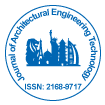A Brief Note on Green Building Design
Received: 09-Dec-2021 / Accepted Date: 23-Dec-2021 / Published Date: 30-Dec-2021
Editorial Note
Green construction is another term for green building. It refers to a structure as well as the use of environmentally responsible and resource-efficient processes throughout the life cycle of a building: from planning to design, construction, operation, maintenance, renovation, and demolition. At all stages of the project, the contractor, the architects, the engineers, and the client must work together closely. Green architecture expands and complements traditional building design factors such as cost, utility, longevity, and comfort.
A sustainable or high-performance building is often known as a green building. From site selection to design, construction, operation, maintenance, renovation, and deconstruction, green building is the discipline of designing buildings and employing procedures that are ecologically responsible and resource-efficient. The traditional architectural design objectives of economy, usability, durability, and comfort are expanded and supplemented by this method.
Green Building
Green buildings are intended to lessen the built environment's total impact on human health and the environment by:
• Receiving the most of energy, water, and other resources.
• Increasing staff productivity while protecting occupant health.
• Waste, pollution, and environmental deterioration are all being reduced.
Green buildings, for example, may employ sustainable materials in their construction (e.g., reused, recycled-content, or renewable resources) provide healthy interior environments with low pollutants (e.g., decreased product emissions) and or include water-saving landscaping (e.g., by using native plants that survive without extra watering). Sustainable construction is a related idea that is generally done on a smaller scale and focuses on using locally accessible natural resources. Sustainable design and green architecture are two more related themes. Sustainability may be described as providing current generations' demands without jeopardizing future generations' capacity to meet their own. Although some green building designs do not address the issue of retrofitting existing homes, others do, especially through government-sponsored energy-efficient restoration projects. Green building concepts may be simply applied to both retrofit and new construction projects.
Green construction encompasses a diverse set of practices, strategies, and abilities aimed at reducing, and eventually eliminating, the negative effects of buildings on the environment and human health. It frequently stresses the use of renewable resources, such as sunshine via passive solar, active solar and photovoltaic technology, as well as plants and trees via green roofs, rain gardens, and rainwater run-off reduction. To improve groundwater replenishment, several different strategies are utilized, such as employing low-impact building materials or using packed gravel or permeable concrete instead of typical concrete or asphalt. While green construction methods and technology are continually changing and may vary by area, the method is founded on the following essential principles: efficient Energy efficiency, water efficiency, materials efficiency, indoor environmental quality improvement, operations and maintenance optimization, and waste and toxics reduction are all areas where improvements may be made.
Green construction is defined by the optimization of one or more of these concepts. Individual green building technologies may also work together to provide a higher cumulative effect with the right synergistic design. The notion of developing a building that is in harmony with the natural characteristics and resources around the site is the aesthetic side of green architecture or sustainable design. Designing sustainable buildings requires many essential steps: specifying 'green' construction materials from local sources, reducing loads, optimizing systems, and generating on-site renewable energy.
Citation: Dan L (2021) A Brief Note on Green Building Design. J Archit Eng Tech 10: e001.
Copyright: © 2021 Dan L. This is an open-access article distributed under the terms of the Creative Commons Attribution License, which permits unrestricted use, distribution, and reproduction in any medium, provided the original author and source are credited.
Share This Article
Recommended Journals
Open Access Journals
Article Usage
- Total views: 1634
- [From(publication date): 0-2021 - Feb 04, 2025]
- Breakdown by view type
- HTML page views: 1088
- PDF downloads: 546
